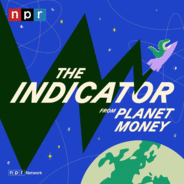Mexico is gearing up to directly elect federal and state judges for the first time this June. President Claudia Sheinbaum says the new system will combat nepotism and increase the integrity of the courts. But critics see it as a naked attempt to dilute the court's independence. Today on the show, how Mexico's judicial reforms are creating angst for businesses at home and abroad. Related episodes: SCOTUS: De-facto pro-business? For sponsor-free episodes of The Indicator from Planet Money, subscribe to Planet Money+ via Apple Podcasts or at plus.npr.org. Fact-checking by Cooper Katz-McKim. Music by Drop Electric. Find us: TikTok, Instagram, Facebook, Newsletter. Learn more about sponsor message choices: podcastchoices.com/adchoicesNPR Privacy Policy

Wirtschaft
The Indicator from Planet Money Folgen
A bite-sized show about big ideas. From the people who make Planet Money, The Indicator helps you make sense of what's happening in today's economy. It's a quick hit of insight into money, work, and business. Monday through Friday, in 10 minutes or less.
Folgen von The Indicator from Planet Money
300 Folgen
-
Folge vom 01.04.2025Should we vote for all judges?
-
Folge vom 31.03.2025Overly Friendly Emails and other marketing pet peevesBrands trying to be your best bud. Generational labels. Gendered double standards. Today on the show: three advertising experts bring their three pet peeves in advertisements.Related episodes: How to make an ad memorable (Apple / Spotify) J. ScrewedThe Gender Gap Series: The Problem With The Pink TaxFor sponsor-free episodes of The Indicator from Planet Money, subscribe to Planet Money+ via Apple Podcasts or at plus.npr.org.Fact-checking by Sierra Juarez. Music by Drop Electric. Find us: TikTok, Instagram, Facebook, Newsletter. Learn more about sponsor message choices: podcastchoices.com/adchoicesNPR Privacy Policy
-
Folge vom 28.03.2025Missing taxes, spiking copper and Napster's re-re-rebirthOn Indicators of the Week, we look at a huge projected tax shortfall, the price of copper and the afterlife of Napster, the peer-to-peer file-sharing service that refuses to die. Related episodes: A new-ish gold rush and other indicators (Apple / Spotify) Can the Federal Reserve stay independent (Apple / Spotify) For sponsor-free episodes of The Indicator from Planet Money, subscribe to Planet Money+ via Apple Podcasts or at plus.npr.org. Music by Drop Electric. Find us: TikTok, Instagram, Facebook, Newsletter. Learn more about sponsor message choices: podcastchoices.com/adchoicesNPR Privacy Policy
-
Folge vom 27.03.2025How nonprofits get cash from your clunkerMany nonprofits accept your used cars as a way to donate. This happens from Make-A-Wish America to Habitat for Humanity to ... public radio stations! So, how does the process actually work? And who takes a cut along the way? Today, we follow the car money.Related episodes: Show your love for The Indicator from Planet Money by making a donation For sponsor-free episodes of The Indicator from Planet Money, subscribe to Planet Money+ via Apple Podcasts or at plus.npr.org.Fact-checking by Sierra Juarez. Music by Drop Electric. Find us: TikTok, Instagram, Facebook, Newsletter. Learn more about sponsor message choices: podcastchoices.com/adchoicesNPR Privacy Policy
